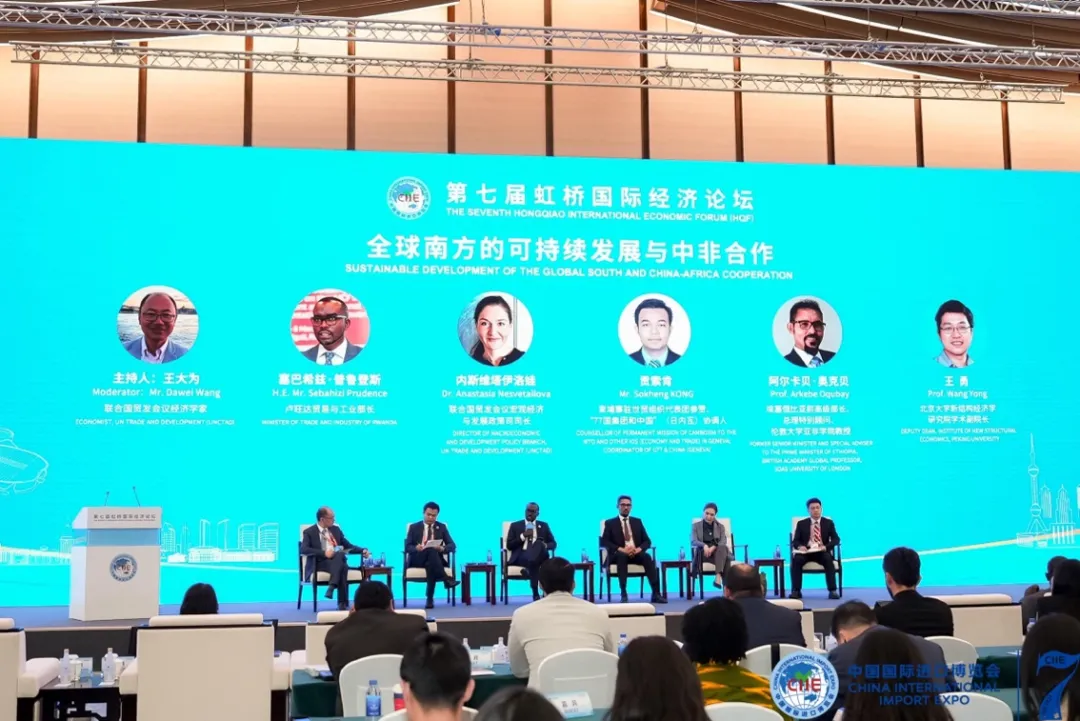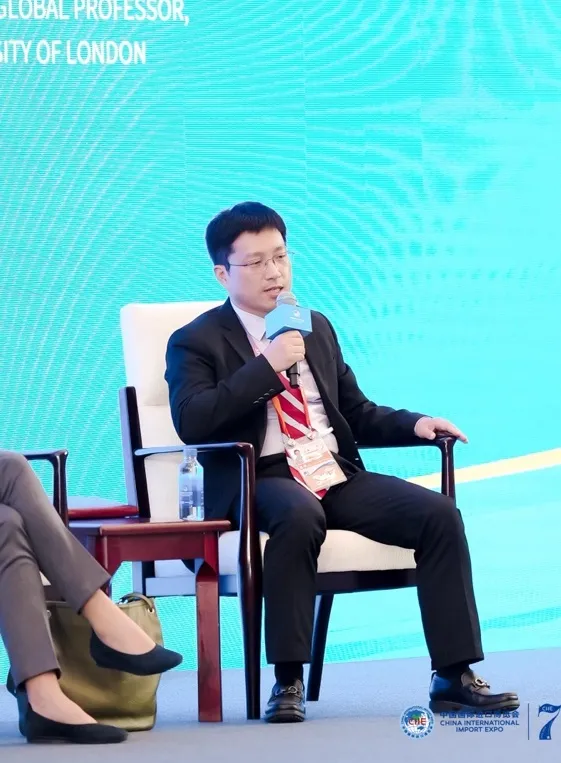英文首页﹀
Deputy Dean Yong Wang Invited to Attend the 7th China International Import Expo and the Hongqiao International Economic Forum
2024-11-14
On November 5, Yong Wang, Deputy Dean of the Institute of New Structural Economics at Peking University, was invited to attend the 7th China International Import Expo (CIIE) and Hongqiao International Economic Forum (HQF). The opening ceremony was hosted by Minister of Commerce Wang Wentao, with Premier Li Qiang delivering the keynote speech. Other prominent participants included the Prime Minister of Malaysia and dignitaries from various countries, who attended and delivered speeches. The Hongqiao International Economic Forum serves as a high-level platform for dialogue and exchange between international political, business, and academic circles. Deputy Dean Yong Wang delivered a keynote speech at the sub-forum on "Sustainable Development of the Global South and China-Africa Cooperation”, hosted by the Ministry of Commerce of China and the United Nations Trade and Development (UNCTAD), which aimed to foster collaborative efforts among Global South countries to address development challenges and promote inclusive and equitable global economic governance. Vice Minister of Commerce Li Fei and UNCTAD Deputy Secretary-General Pedro Manuel Moreno also delivered organizational speeches at the forum.

Deputy Dean Yong Wang began his speech with an in-depth analysis of the prospects for cooperation between China and the Global South. He noted that China has maintained an average annual GDP growth rate of about 9% over the past 45 years but has recently seen a decline in growth. As a large middle-income country, China faces two major challenges: the Middle Income Trap and the Thucydides Trap. However, he believes that these traps are not China's "destiny. He emphasized that China should develop new-quality productive forces by enhancing total factor productivity (TFP) to achieve high-quality development. Economic theory tells us that there are two ways to improve TFP: promoting technological progress and optimizing resource allocation. The former requires us to choose the most suitable methods for obtaining technological advancements based on different types of industries. In leading or emerging industries, it is necessary to increase investment in scientific research and institutional innovation, striving for revolutionary technological breakthroughs. Leveraging China's advantages of a super-large market size and a comprehensive industrial base, these significant technological breakthroughs can be transformed into deep industrial transformation and upgrading, which can truly promote economic growth. To optimize resource allocation, two key points must be addressed: first, strive to integrate new technologies, models, and elements to achieve innovative allocation of elements; second, deepen market-oriented reforms and reduce distortions to minimize resource misallocation and enhance efficiency. Professor Wang noted that China needs to transition from investment-driven growth to innovation-driven growth to balance traditional, emerging, and future industries. Currently, China faces a "sandwich" challenge in the global economy, with the "containment effect" of more innovative developed countries ahead and the "catch-up effect" of developing countries with lower labor and other factor costs behind. To this end, China should continue to promote the TFP improvement of traditional industries to prevent premature decline and relocation of industries that have not yet fully upgraded, while also increasing R&D investment, reforming the innovation system, comprehensively promoting strategic emerging industries, cultivating future industries, and optimizing industrial layout. This will enable China to gain more initiative in technological and industrial competition with developed countries, striving to break through the "double containment" of trade and technology, especially in the face of the Thucydides' Trap challenge amid the current great changes unseen in a century.

In his speech, Deputy Dean Yong Wang emphasized that South-South cooperation, especially China-Africa cooperation within the framework of the Belt and Road Initiative, is crucial for China's sustainable growth in the medium and long term. Over the past decade, under the Belt and Road Initiative, China has collaborated with countries along the route to complete around 3,000 infrastructure projects, with a total investment of approximately $1 trillion, of which 71% is related to energy and transportation infrastructure. These infrastructure investments not only directly contribute to the industrialization and economic development of African countries, but also positively impact China's own economic growth and income enhancement through various means, such as boosting Chinese exports, increasing overseas direct investment, promoting imports to reduce production and consumption costs, and facilitating the reallocation of released Chinese factors towards higher value-added industries or sectors. In the long run, this could potentially generate a "multiplier effect". If we further consider the possibility that some developed countries may continue to impose substantial tariffs on Chinese products, the market of a more economically developed Global South will become even more significant to China's own economic development.
Deputy Dean Yong Wang summarized that at the beginning of China's reform and opening-up, the per capita income in Chinese Mainland was less than one-third of the average level in sub-Saharan Africa. Now, through reform and opening-up, by leveraging the roles of an effective market and a capable government, China has become the world's second-largest economy. This in itself serves as a tremendous inspiration and demonstration for the vast number of African countries. Through strengthening South-South cooperation, particularly China-Africa cooperation, China can not only support the development of African countries through foreign trade, capital, and technology but also offers Chinese wisdom and solutions on the path to modernization for Southern nations, which is “intellectual” support. This will also contribute to China's own economic growth and that of other countries globally. This win-win model aids in the collective prosperity of Global South countries and contributes positively to global economic governance and sustainable development.

